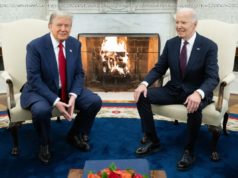BEIRUT — A misdirected airstrike by the U. S.-led coalition earlier this week killed 18 allied fighters battling the Islamic State group in northern Syria, the U. S. military said Thursday. U. S. Central Command said coalition aircraft were given the…
BEIRUT — A misdirected airstrike by the U. S.-led coalition earlier this week killed 18 allied fighters battling the Islamic State group in northern Syria, the U. S. military said Thursday.
U. S. Central Command said coalition aircraft were given the wrong coordinates by their partner forces, the predominantly-Kurdish Syrian Democratic Forces, for a strike intended to target IS militants south of their Tabqa stronghold, near the extremists’ de facto capital, Raqqa.
The strike hit an SDF position instead, killing 18. Central Command said the strike was launched Tuesday.
Several nations have lent their air power to the U. S.-led coalition to defeat the Islamic State group. It was not clear which air force was behind the strike.
The SDF acknowledged the strike on Thursday, saying a number of its fighters were killed and wounded.
The SDF-linked Hawar News Agency reported the group was holding funerals for 17 of its fighters in the border town of Tal al-Abyad, though it did not link them to the strike. An activist-run group, Raqqa is Being Slaughtered Silently, says three days of mourning have been declared for the town. The Britain-based Syrian Observatory for Human Rights said 25 SDF fighters were killed in the last two days of battle.
The SDF meanwhile announced the launch of a fourth phase of their campaign to capture Raqqa, a Euphrates River city that is home to 300,000 people.
The SDF, with U. S.-led air and ground support, has surrounded Tabqa, some 40 kilometers (25 miles) southwest of Raqqa. They say they are working to clear Islamic State militants out of Jalab Valley, north of Raqqa.
The SDF says it wants to isolate Raqqa before attacking it. Their closest position is less than 8 kilometers (5 miles) northeast of the city. But the countryside south of Raqqa is still under IS control. It is unclear how many stages are planned for the campaign.
In a separate development, President Bashar Assad said a chemical attack on a rebel-held town earlier this month that was widely blamed on his forces was a “fabrication.”
“Definitely, 100 percent for us, it’s fabrication,” Assad told Agence France-Presse in his first comments since a U. S. missile strike on a Syrian air base in response to the chemical attack.
“Our impression is that the West, mainly the United States, is hand-in-glove with the terrorists. They fabricated the whole story in order to have a pretext for the attack.”
Syria strongly denied it was behind the April 4 chemical attack on Khan Sheikhoun, which killed 87 people. Syria’s foreign minister has said Syrian warplanes struck an al-Qaida arms depot that contained chemical weapons.
Assad denied having chemical weapons and said Syria would only allow an “impartial” investigation into the incident. A video of the interview was released by Assad’s office.
The international chemical weapons watchdog is testing samples from the suspected nerve gas attack and could produce a report on the matter within three weeks, the British delegation to the commission said Thursday.
The report comes one day after Russia vetoed a Western-backed U. N. Security Council resolution demanding a speedy probe into the Khan Sheikhoun attack. U. S. Ambassador to the U. N. Nikki Haley said the veto left Moscow, a key ally of the Syrian government, with “a lot to prove.”
The Organization for the Prohibition of Chemical Weapons has a standing fact-finding mission on Syria to investigate alleged chemical weapons attacks, but does not apportion blame. The OPCW’s executive council met Thursday to discuss the attack on Khan Sheikhoun, in the northern rebel-held province of Idlib.
Britain’s delegation to the OPCW tweeted from the executive session that the “Fact Finding Mission is working to gather evidence” and has already started testing samples in a lab.
The U. S. blamed the Syrian government for the attack and fired 59 missiles at an air base in central Syria in response, killing nine people.
Russian Foreign Minister Sergey Lavrov said he expected the OPCW to conduct an extensive probe into the attack, and insisted the organization visit both Khan Sheikhoun and the air base struck by U. S. missiles.
The Syrian army meanwhile said hundreds of Islamic State fighters as well as civilians were killed when a U. S.-led coalition airstrike hit a militant position in the eastern province of Deir el-Zour.
It said white smoke billowing from the area of the strike turned yellow, “most likely because of the explosion of a large warehouse containing large quantities of toxic substances.” It said that the airstrike showed that militants have chemical weapons in their possession.
Opposition activist Omar Abu Laila, who is from Deir el-Zour and currently lives in Europe, denied that report. Abu Laila is with Deir Ezzor 24, an activist group that has reporters throughout the eastern province.
Associated Press writers Sylvia Hui in London and Vladimir Isachenkov in Moscow contributed to this report.






